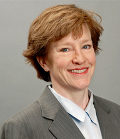Karen K. Lewis

- Joseph and Ida Sondheimer Professor in International Economics and Finance, Professor of Finance, Professor of Economics
Contact Information
- Primary Email:
lewisk@wharton.upenn.edu - Office Phone:
(215) 898-7637
- office Address:
2446 Steinberg-Dietrich Hall
3620 Locust Walk
Philadelphia, PA 19104
Research Interests: asset pricing, international finance, macrofinance, investments
Links: CV, Personal Website
Activity
Latest Research
Fabio Ghironi and Karen K. Lewis (Working), Equity Sales and Manager Efficiency across Firms and the Business Cycle.
All ResearchIn the News
Research Roundup: Foreign Diversification, Social Comparisons and Consumer IdentityIs investing in foreign stocks still a good strategy for offsetting risk and boosting returns in your portfolio? How do social comparisons impact the different dimensions of trust that people can have for each other? How can companies use emotional cues to convey a particular identity to consumers? Wharton professors Karen Lewis, Maurice Schweitzer and Patti Williams, respectively, examined these issues -- and what they mean for business and consumers -- in recent research papers.…Read More
Knowledge at Wharton - 5/8/2013

